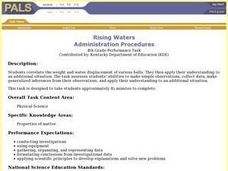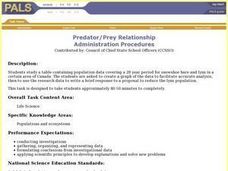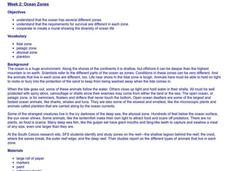Curated OER
Home Sweet Home
Students examine the animals that live in trees. They identify their sounds, footprints and droppings. They draw pictures of the animals as well.
Curated OER
Ice Mummies: Frozen in Heaven
Students conduct an experiment to investigate the rate of microbial growth at different temperatures. Students predict what will happen to the food at various temperature and test their hypotheses. Students describe the differences in...
Curated OER
How Do Cells Reproduce?
Students discuss the importance of reproduction of cells. They identify and describe the stages of Mitosis. They discover what happens to chromosomes and DNA during reproduction.
Curated OER
What Does My Bacteria Look Like?
Students identify Gram positive and Gram negative bacteria using staining techniques. Students research importance of identification of bacterial types in diagnosing bacterial diseases.
Curated OER
Creek Monitoring
Sixth graders conduct a variety of assessments at a local stream to determine if it is a suitable habitat for salmon. They measure temperature, tubidity, dissolved oxygen, pH levels, bacteria and nutrients. In this unit, 6th graders work...
Curated OER
Matter
Third graders are introduced to the topic of matter. As a class, they brainstorm what they already know about matter and its properties. After completing a worksheet, they participate in an experiment in which they observe matter in...
Curated OER
Floating Pencil
Students discover how salt water makes a pencil float better than freshwater by measuring and comparing the lengths of the portion of the pencil that floats above the water surface. They then determine if an unknown water sample is...
Curated OER
Rising Waters
Fourth graders rank balls by size from smallest to largest and from lightest to heaviest and then by how much they made the water rise. They then discuss why certain balls make the water rise higher than do other balls.
Curated OER
Temperature School
Pupils observ the cooling and warming of room temperature, hot, and ice cold cans of water by measuring the change in temperature over time. They then attempt to develop explanations for the observations made and apply their findings to...
Curated OER
Balls and Ramp
Students role several balls of different weights down a ramp and into a paper cup and record how far each ball made the paper cup move. They then answer questions that help them analyze their results and reinforce the idea that energy...
Curated OER
Swingers
Students investigate the motion of a swinging pendulum. They experiment with a pendulum to find out why it might swing at different speeds at different times.
Curated OER
Colored Dots 1
Students observe that colored markers are a mixture of many different colors by performing a chromatography experiment. They make observations, record information, and make generalized inferences from their observations.
Curated OER
Observing Objects
Students observe the motion of both a pendulum and a spring pendulum . They then explain the differences and the similarities between the two types of motions.
Curated OER
Plastic Wrap
Learners compare the price and quality of different kinds of plastic kitchen wraps and then rank them from best to worst. They take into account how well it comes out of the roll, if it seals well, it is tangles, how much weight it...
Curated OER
Colored Drops
Students examine the properties of a liquid that contains water and food coloring and a liquid that contains water, food coloring and a liquid detergent. They interpret their data, describe properties, and make reasonable explanations...
Curated OER
Interdisciplinary Task: Weather
Students design a chart to use to record the weather for five days. They then build an anemometer to record wind speed and discover why they are used for this purpose.
Curated OER
More Lizard Snacks
Students listen to Chapter I, Chapter II, Chapter III, and Chapter IV of "The Forgetful Pony". They observe different stages of development of mealworms. The student sequences pictures to show the life cycle and draws the developmental...
Curated OER
Bounce Back Ball
Fifth graders work in teams of four to measure the rebound heights of a tennis ball dropped from four different heights. They investigate with the bouncing balls to measure changes in the type of energy they possess.
Curated OER
Predator/Prey Relationship
Students study and analyze data collected on the relationship between the snowshoe hare and lynx in Canada over a 28 year period and create a graph. Students also write a response to a proposal to reduce the lynx population.
Curated OER
Ocean Zones
Students create a mural showing ocean zones and the diversity of ocean life. They use reference books to create a list of plants and animals that would live in each zone.
Curated OER
Where The Blue Fern Grows
Students discuss ancient plants and their adaption in the world. Students review forms of plant propagation. Given proper supplies and directions, students apply a variety of fern spores to peat pellets, monitor the growth, and...
Curated OER
The Importance of Plants to Native Cultures in the Past and Present
Eighth graders investigate the founding and history of Sluice Boxes State Park. They use both primary and secondary resources to collect data. The focus is upon the use of native plants to make medicines. They write reports about several...
Curated OER
Indoor Air: What's the Matter?
Young scholars investigate the variety and amount of particulate matter in the air. They locate the general sources of pollution for a specific area and develop some suggestions for improving air quality.
Curated OER
The Causes of Differences in Density
Students explore how density changes. Students read an article on density. They observe a ball and ring demonstration and discuss the outcome. Students draw models of the demonstration and explain what happened.
Other popular searches
- Parts of a Microscope
- Compound Microscopes
- Label Compound Microscope
- Dissection Microscopes
- Microscope Cheek Cells
- Digital Microscope
- Microscope Lab
- Biology Lab Microscopes
- Scanning Electron Microscopes
- Cheek Cells and Microscopes
- Lesson Plan on Microscopes
- Lenses and Microscopes

























